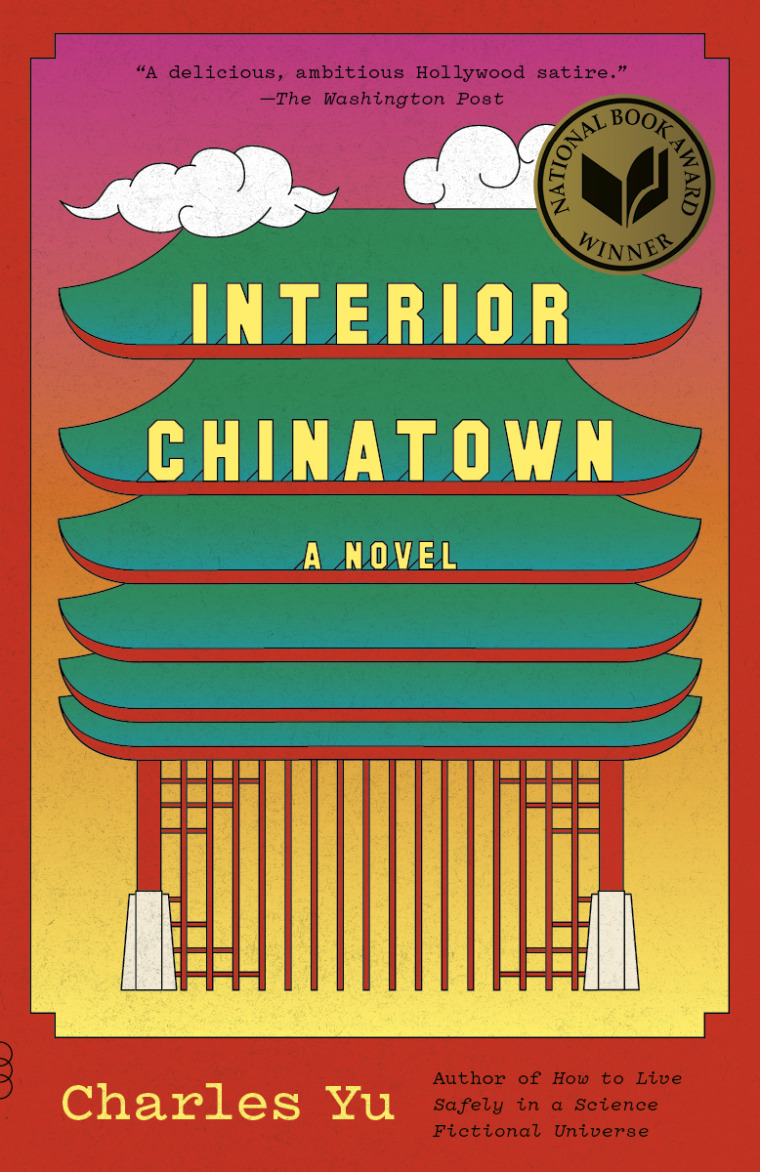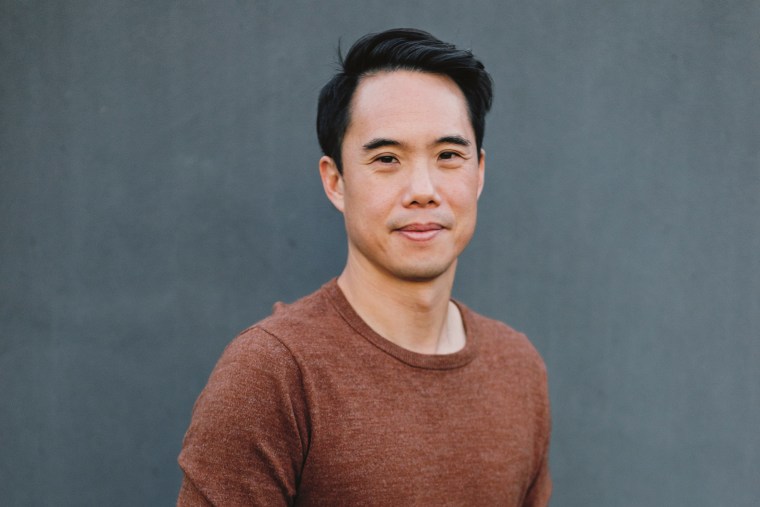When Charles Yu took home the National Book Award for fiction last week for his novel “Interior Chinatown,” he celebrated in an unconventional way: He changed out of the black suit he wore to the virtual ceremony back into the shorts he’s been wearing throughout the pandemic and shared a frozen pizza with his family.
“I was so stunned that I forgot to thank my parents and my wife and my kids and it’s been honestly eating me alive,” Yu told NBC Asian America, noting that he didn’t write a speech because he did not believe he would win. “The wonderful people at my publisher had sent over a bottle of Champagne and that was part of the reason I wasn’t super coherent.”
Thirteen years ago, the National Book Foundation first recognized Yu as a "Five Under 35" honoree for his debut short story collection “Third Class Superhero.”
Yu, 44, a former corporate lawyer, said he was “in shock” that he is the recipient of one of the country's most prestigious literary prizes, in company with authors such as William Faulkner, Flannery O’Connor, Philip Roth and Toni Morrison.
“I still look at literature with this sense of reverence, and maybe it’s also part of the psychology of growing up feeling like I’m not supposed to be on the stage, so I’m very uncomfortable with it,” he said. “I think I’ll always do best and feel best when I’m standing in the corner observing and reading other people's books.”
Set in a fictional Chinatown, the humorous and sometimes heartbreaking Hollywood satire follows Willis Wu, a Taiwanese American actor relegated to background roles such as “Generic Asian Man,” “Silent Henchman,” and “Delivery Guy,” on a police procedural called “Black and White” that films at Golden Palace, a Chinese restaurant where the television show is perpetually in production.

Wu, who dreams of one day becoming “Kung Fu Guy,” struggles to figure out where he belongs on screen, in life and in America’s Black-white binary paradigm of race.
Inventively written in the form of a screenplay and narrated in the second person, the immersive novel examines identity, Asian stereotypes and the roles we’re allowed to play on and off screen.
“The invisibility of Asians in the stories I consumed was speaking to me on a level I probably didn’t process until I wrote the book,” said Yu, who was raised by Taiwanese immigrant parents in Los Angeles along with his younger brother, Kelvin Yu, an Emmy-winning writer and actor.
“How much does it do to your psyche to say, I don’t see myself and other people don’t see me as somebody who could be in this kind of story or this kind of life? You can’t be the main character; if you’re in the story at all it’s a very specific kind of role or really as background or furniture, and that kind of takes away your personhood.”
Yu tried to write the book that would become “Interior Chinatown” for many years and said its current version didn’t take shape until 2017. “It was absolutely tied to the election of Donald Trump as president,” he said, noting that his own family’s experiences helped inspire the narrative. “It just gave it such a new urgency; it made me think, I have to be bolder about what I’m trying to say.”
He added that while the novel has a comic tone to it, he doesn’t mean to take away from the weight of the issues it explores. “What I’m trying to talk about is that people, especially Asians, have been excluded, literally excluded, from being Americans for decades, and they’re not the only group,” he said.
Hulu is currently developing “Interior Chinatown” as a series and Yu is adapting his own work. He said his goal is to find a way to translate the novel’s unusual form to the screen while telling a story in a way “that will shake people out of patterns of thinking in a way I was trying to do with the book.”
Yu is known for writing meta and complex work. His 2010 novel, “How to Live Safely in a Science Fictional Universe,” featured a time-machine repairman named Charles Yu, and his 2012 short story collection, “Sorry Please Thank You,” is populated with virtual warriors and a company that outsources grief for profit.
A self-described awkward kid who loved reading and “tried hard with everything,” Yu was a pre-med student at University of California, Berkeley, when he came home one semester and told his parents he wanted to be a poet. “That didn’t go over super well,” said Yu, the son of an aerospace engineer father and a mother who worked as a school district accountant.
Wanting to be responsible and a financially independent member of the family, Yu chose to go to law school instead.
“It wasn’t the easiest at some points in terms of how do you balance feeling like a responsible kid, knowing what my parents had done and sacrificed with what’s the right thing to do? I didn’t want to disappoint [my parents], and I also wanted to be able to take care of myself.”
But the urge to write was still there. After graduating from Columbia Law School in 2001, Yu began writing fiction, but worked as a lawyer for 13 years before focusing full-time on writing books and television.
Nearly 20 years later, Yu is a permanent part of American literature thanks to the National Book Award. And while he’s honored, he also appreciates hearing from readers who say they feel seen in “Interior Chinatown.”
“It never stops being a reminder to me that as much as I might think I’m scribbling away alone, when the book does reach people and find a reader, when it really connects with someone sitting alone on the subway or in their house, it’s a real connection.”
